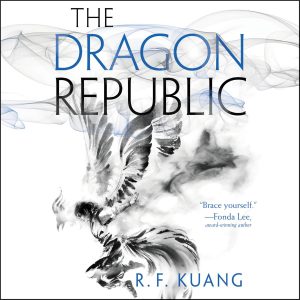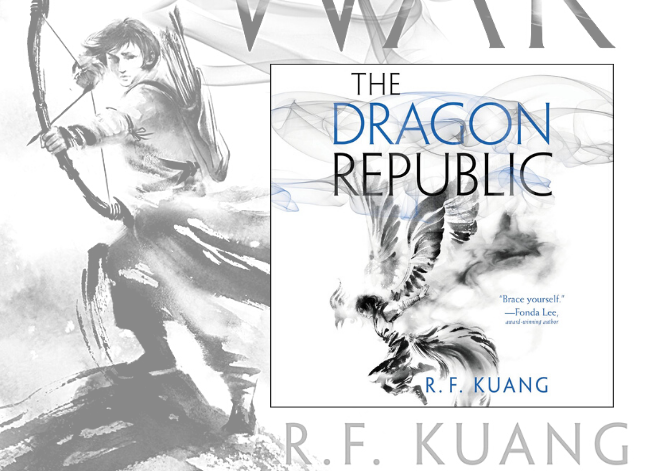The Dragon Republic (The Poppy War #02) by R. F. Kuang — Book Review
 History is a comedy of errors turned tragic, and that is knowledge Rebecca F. Kuang has a firm grip on.
History is a comedy of errors turned tragic, and that is knowledge Rebecca F. Kuang has a firm grip on.
The Dragon Republic is the sequel of one of my most favourite fantasy novels ever, and that it took me literal ages (LITERAL AGES HAVE PASSED SINCE THIS CAME OUT) to get to it should be a red mark in my reader’s dossier forever. What an excellent, remarkable read it was; even if the sheer bloody characters infuriated me to no end—but, y’know, in a good way!
Following the cataclysmic finale of The Poppy War, the story opens with a drug-addled Runin high on opium and lacking in allies, driven forward only by her hatred for the Nikara Empress, Su Daji, and the need to wreak vengeance upon her. Rin is at her absolute lowest, having forgotten every single lesson she once learned at Sinegard. Once among the most promising strategists of the Academy’s pupils, Rin is driven to the deepest lows by her poppy addiction, and worse: “She was dreadful at leadership. Most of her attack plans over the past three months had boiled down to “everyone attack at once and see if we come out all right on the other side.”” As you might imagine, such fine schemes offer a fresh new disaster for Rin and her fellow shamans of the Cike before long.
Extricated from a catastrophe of their own making by an unexpected new ally, Rin and the Cike find themselves a cause to work towards – the establishment of a republic, the Dragon Republic, in the place of the Nikara Empire, where everyone will have the right to vote and choose their own destiny…or so the pitch goes. Rin doesn’t join out of any fealty to lofty ideals, however – it’s vengeance that motivates her, the cause but a tool and an excuse. But to get it, Rin needs to control the power inside of her: “She wished desperately that she had better control over the fire. Or any control at all. But the Phoenix was antithetical to control. The Phoenix wanted a roaring, chaotic blaze, consuming everything around her as far as the eye could see.” I got goosebumps, did you?
Speaking of, the prose never ceases to impress. I’ve got a stack of quotes highlighted on my Kindle, a whooping 144 (One-Hundred Forty-Four!!!) of them, and only two of these were of words I did not know. Take that, tassel!
The ending is gut-wrenching, a fresh new hell for Rin to add to some impressive emotional and physical scarring. The promise made for the next book, however, has me itching for November when The Burning God will release, and this brilliant trilogy will, at last, come to a close.
And what of combat? Pfft, I haven’t been this excited about naval tactics since I saw Extra History’s videos on Korea’s (and possibly the world’s) greatest naval strategist, Admiral Yi. A solid dozen chapters, at least, deal with the Dragon Republic’s naval push upriver, and those consist of some of the novel’s most engaging and exhilarating sequences. Rin’s action sequences make for no less impressive reading.
The cast of characters is, as Kuang loveably refers to them on her Twitter, full of idiots — but loveable, amazing, occasionally brilliant idiots. And damn funny, to boot. Kitay is a lot of fun, always — and the leader of the Dragon Republic is exceptional, a character whose depth is eclipsed only by Su Daji and Rin herself.
As far as sequels go, this one improves in virtually every element of Kuang’s debut – the prose is stronger, the characters continue to have well-woven arcs, and the worldbuilding is ambitious and well-crafted. That’s not to say The Poppy War didn’t do well in any of these; on the contrary, it was one of my absolute favourite titles of 2018. But every debut has rough surfaces, and The Dragon Republic goes a long way to rounding all of them out.
Like its predecessor, the Dragon Republic also serves as a gateway book to the history of China. Kuang’s book so well reflects the complexities and tensions of Imperial China – the pressures between South and North, the inherent threat to Imperium that is decentralization and regional authority, the rigidity of social hierarchy. These themes are all there, and their exploration is likely to awaken your interest in a culture and history that might be very different from your own.
The Dragon Republic held me enthralled for long, sleepless nights – but those make for a small price to pay, for the dreams Kuang offers in return.

